06 Nov2019
By Jerrica Thurman
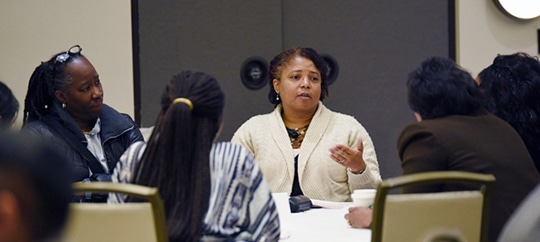 You may now access online the lineup of more than 300 sessions at the 2020 Annual Meeting through the AACTE Event Planner. Take advantage of this all-in-one tool to help plan your conference experience with a few easy clicks!
You may now access online the lineup of more than 300 sessions at the 2020 Annual Meeting through the AACTE Event Planner. Take advantage of this all-in-one tool to help plan your conference experience with a few easy clicks!
To start selecting sessions to attend, visit planner.aacte.org. Once you have logged in, sort through the hundreds of sessions by searching titles, descriptions, presenter names, locations, and other fields. You can also filter sessions by the four conference strands as well.
06 Nov2019
By Hannah Astin
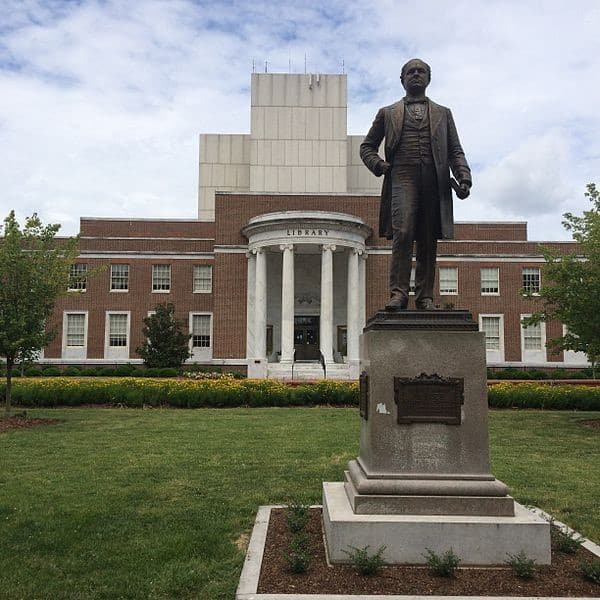 This article originally appeared in The Carolinian and is reprinted with permission.
This article originally appeared in The Carolinian and is reprinted with permission.
With a new multi-million-dollar grant, UNC-Greensboro’s (UNCG) School of Education will create a new teaching program focused on bringing high-tech thinking to two rural North Carolina counties.
The 5-year, $6.1 million grant comes from the Teacher Quality Partnership grant program under the United States Department of Education.
UNCG School of Education will use the grant money to establish the Piedmont Teacher Residency Partnership. The Partnership will train new teachers in new technology and problem solving, and the teachers will be placed in some public schools in Rockingham and Surry counties.
06 Nov2019
By Jerrica Thurman

AACTE is excited to announce the release of its new video series on Diversity, Equity and Inclusion in educator preparation. The videos address a wide variety of topics ranging from promising practices for recruiting and retaining teachers of color, to the importance of culturally relevant teaching for growing the special education teacher pipeline, and also promoting equal access to quality teachers, just to name a few.
The video series exemplifies the Association’s new strategic priority to promote diversity, equity and inclusion. AACTE and its members value the diversity of students, their families, and educators; equity in access to high quality instructional environments; and the inclusion of all students, defined as access and opportunity in PK-20 classrooms.
05 Nov2019
By John Kuykendall

Our nation and the entire world are changing rapidly. With the rise of threats to our children’s safety like depression, lack of mental health resources, familial disruptions, and school violence and shootings, it is imperative that we equip teachers and school personnel with the tools they need to recognize and respond to all students, in all classrooms.
In today’s schools, students are suffering from a variety of issues; one that arises too often is mental health. Unfortunately, it is not always apparent what these students are experiencing. Depression is rampant. Emotional stress stems from a variety of external factors including depression, divorce, social media anxiety, lost friendships, bullying or simply feeling out of touch with others. It is imperative, now more than ever, that our teachers are prepared to notice when students are experiencing these types of trauma. Trauma informed practices allow teachers to be trained well beyond the obvious clues and prepares them to be aware of early, less apparent warning signs, so they can successfully and swiftly intervene to help a student in need.
04 Nov2019
By Diana Lambert

This article and photo originally appeared in EdSource and are reprinted with permission.
Jennifer Garza, a 7th grade English teacher at Green Acres Middle School in Visalia, was teaching on an intern credential in 2015.
Two federal grants totaling over $9.4 million will help California recruit teachers and mental health professionals to rural schools.
The U.S. Department of Education awarded the five-year grants to the California Center on Teaching Careers, an organization started in 2016 to help solve the persistent teacher shortage. The center is run by the Tulare County Office of Education, in partnership with California State University Bakersfield.
04 Nov2019
By Jacqueline E. King, Ph.D.
The 2019 election for the AACTE Board of Directors is now underway through November 29. Four seats will be decided via online voting:
- Two at-large seats
- One representing the Association of Independent Liberal Arts Colleges for Teacher Education (AILACTE)
- One representing the Council of Academic Deans from Research Education Institutions (CADREI)
01 Nov2019
By Jacqueline Rodriguez
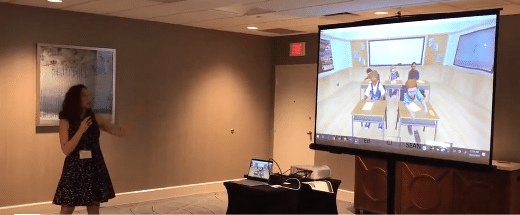 AACTE President and CEO Lynn Gangone and I had the privilege of demonstrating the Association’s commitment to Inquiry and Innovation during a recent visit to New Orleans.
AACTE President and CEO Lynn Gangone and I had the privilege of demonstrating the Association’s commitment to Inquiry and Innovation during a recent visit to New Orleans.
AACTE collaborated with member institution, the University of Central Florida, to present the TeachLivE™ Lab (TLE Lab) to members of Grantmakers for Education during their recent conference in Louisiana. Grantmakers for Education is the nation’s largest and most diverse network of education grantmakers dedicated to improving educational outcomes and increasing opportunities for all learners.
01 Nov2019
By Jane E. West

This blog post is written by AACTE consultant Jane West and is intended to provide update information. The views expressed in this post do not necessarily reflect the views of AACTE.
It’s been quite a week in DC. The most impressive news is having our home team—the Nationals—win the World Series, despite their substantial underdog status. Other than that, the House voted to proceed officially with the impeachment process on a totally partisan basis—and that promises to suck the oxygen out of any sort of Congressional agenda for months.
Are we Headed to a Government Shutdown … Again?
While the Senate made progress on funding bills this week, big hurdles remain. The Senate passed a package of four appropriations bill with a bipartisan vote of 84-9, the first funding bills to pass the Senate. However, Senate Democrats blocked movement on the package of two large spending bills: Defense and Labor/HHS/Education. They are not happy that President Trump is insisting on funding for his border wall and that the Labor/HHS/Education bill’s spending level is so low.
01 Nov2019
By Preston Thorne
 This op-ed article originally appeared in The State and is reprinted with permission.
This op-ed article originally appeared in The State and is reprinted with permission.
I was wasting time on Twitter when I came across a post that stopped me mid-scroll. The original post posed a question: How many black male educators did you have in kindergarten through 12th grade.
One of my former students chimed in with a shocking number: 1…Coach Thorne.
That’s me; that’s who I was. I taught social studies at Blythewood High School for 11 years and was an assistant football coach.
At first glance, the number 1 seems to be an indictment and a referendum on what we in education circles have known forever—we need more black men in the classroom. But upon further inspection, with a little critical analysis, I believe there is power in one.
Statistics tell us that having just one African American teacher in elementary school reduces drop-out rates among black boys by nearly 40% and increases their recognition as gifted students.
But stats don’t tell the story.
31 Oct2019
By Cecelia Monto

The need to diversify the teaching workforce is well documented (Darling-Hammond, 2010). Student demographics across the United States have significantly changed in the last 20 years, with particular increases in bilingual and Hispanic student populations (Aud, Hussar, Kena, Bianco, Frohlich, Kemp, &Tahan, 2011). However, the teaching workforce has not reflected the shift in student demographics, and a growing gap has emerged between the racial and ethnic backgrounds of students and teachers. Because community colleges serve a high percentage of diverse students, a community college pathway into teaching represents a promising approach for increasing the diversity of the teaching workforce.
31 Oct2019
By Jingzi Huang
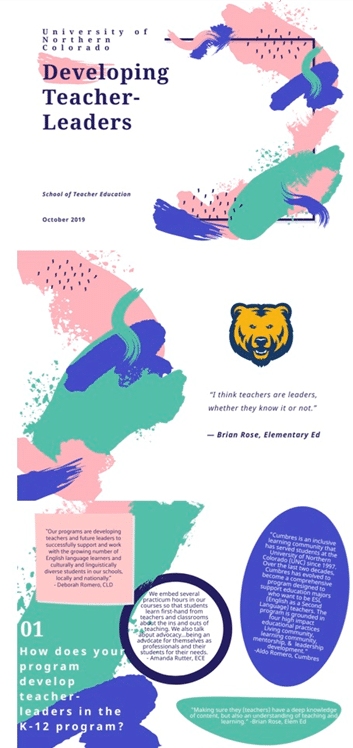
The University of Northern Colorado (UNC) holds a long-standing tradition of developing its future teachers as leaders in the community. Since 1889, the school has taken pride in its commitment to teacher excellence. However, never content to settle, the faculty and staff that constitute UNC’s School of Teacher Education (STE) continue to encourage the next generation of teachers to blaze their own trails and inspire change in their communities.
In addition to delivering the widest array of licensure programs in Colorado to meet the state and national needs, STE at UNC offers specialized licensure and endorsement opportunities within its diversity framework. Programs such as the Cumbres Teacher Preparation Program—an inclusive learning community that has served students at UNC since 1997—and Culturally and Linguistically Diverse (CLD) and Teaching English to Speakers of Other Languages (TESOL) endorsements urge teachers to utilize culturally responsive curriculum in the classroom.
Aldo Romero, the director of Cumbres, says the Cumbres program “is a co-curricular, student support services and scholarship program. Over the last two decades, Cumbres has evolved to become a comprehensive program designed to support education majors who want to be English as a Second Language teachers (ESL). The program is grounded in four high impact educational practices: living community, learning community, mentorship, and leadership development.” He also says that Cumbres educators are constantly “acquiring new knowledge and skills to support their development to become not only excellent teachers but also exceptional leaders in K-12 settings.”
29 Oct2019
By Jerrica Thurman
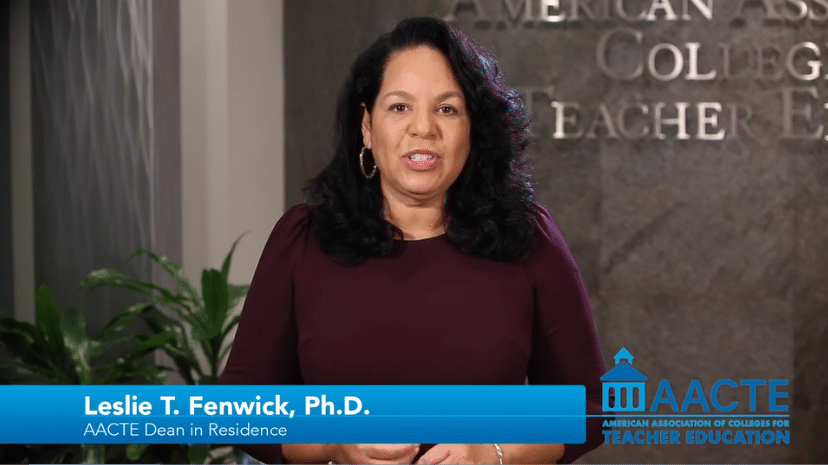 During the month of October, AACTE has addressed the importance of school safety in its recent Thought Leadership series. AACTE Dean in Residence Leslie T. Fenwick took time to share in this video how she led a new approach at Howard University to prepare teacher candidates for ensuring safe learning environments in classrooms. In 2010, Howard’s College of Education innovated its undergraduate elementary education program by focusing on ways to better meet the safety needs of local students in its Washington D.C. community.
During the month of October, AACTE has addressed the importance of school safety in its recent Thought Leadership series. AACTE Dean in Residence Leslie T. Fenwick took time to share in this video how she led a new approach at Howard University to prepare teacher candidates for ensuring safe learning environments in classrooms. In 2010, Howard’s College of Education innovated its undergraduate elementary education program by focusing on ways to better meet the safety needs of local students in its Washington D.C. community.
To evaluate the impact of the new program, “Teacher Talks” were convened with faculty members and novice teachers who were recent graduates of Howard’s College of Education. The graduates shared case studies about their students during the meetings and stories about how many of their children were exposed to violence either in their home or community, oftentimes with a relative being shot. The graduates also reported that their training in human development, with an asset lens, and the knowledge base they received from courses outside of the college of education helped them to reach their students individually as a teacher or connect them to resources in their community.
29 Oct2019
By Jacqueline Rodriguez

AACTE is excited to partner with the Educator Preparation Laboratory (EdPrepLab), an initiative of the Learning Policy Institute (LPI) and Bank Street College of Education, to bring a series of webinars to members. Educator preparation programs across the country can access AACTE and EdPrepLab resources to support their teaching, research, and policy in higher education.
In this series of webinars, our members will hear from member institutions, stakeholders, scholars, practitioners, and policymakers as presenters dive into topics that will include addressing social emotional learning, cultural competence, creating inclusive classroom and school environments, and teacher residency models.
We hope you will register for our first webinar on Social and Emotional Learning, Cultural Competence, and Equity in Teacher Preparation that will take place on November 14 at 3:00 p.m ET. The panel of experts include:
29 Oct2019
By Jane E. West
 This blog post is written by AACTE consultant Jane West and is intended to provide update information. The views expressed in this post do not necessarily reflect the views of AACTE.
This blog post is written by AACTE consultant Jane West and is intended to provide update information. The views expressed in this post do not necessarily reflect the views of AACTE.
Funding Bills Move in the Senate, but Not for Education
November 21, less than a month away, is the date the government runs out of money. The ball is in the Senate court, as they have yet to pass any appropriations bills on the floor. Majority Leader McConnell (R-KY) has teed up passage of the first package of funding bills, which Democrats have said they will support. But that package does not include education spending, which is in the Labor/HHS/Education appropriations bill.
29 Oct2019
By Deborah Koolbeck
 Registration is open for the AACTE member exclusive October 2019 Federal Update webinars. AACTE offers these webinars to you on two different days of the week and at two different times to accommodate members’ teaching schedules and time zones.
Registration is open for the AACTE member exclusive October 2019 Federal Update webinars. AACTE offers these webinars to you on two different days of the week and at two different times to accommodate members’ teaching schedules and time zones.
Even though one might expect activities to slow down in Washington as the year begins to wind down, plenty is happening that impacts the profession. On October 15, Chairman Scott (D-VA) of the U.S. House of Representatives Committee on Education and Labor revealed his proposal for reauthorizing the Higher Education Act. What does it look like for educator preparation? Will Chairman Alexander (R-TN) move his bill through the U.S. Senate Committee on Health, Education, Labor, and Pensions? And not to be forgotten is the appropriations process—as the Congress heads toward a November 21 deadline for funding the federal government, what is the outlook? Will there be another short-term Continuing Resolution (CR), or could we see even a year-long CR? Could a government shutdown happen? This webinar will cover these topics, as well as the advocacy steps that you can take to engage in the process, and there will be a Q & A session for you to get your answers to your questions. Register today!
Tuesday, October 29, 2019, 5:00-6:00 p.m. EDT: Register now.
Wednesday, October 30, 2019 11:00 am-12:00 noon EDT: Register now
 You may now access online the lineup of more than 300 sessions at the 2020 Annual Meeting through the AACTE Event Planner. Take advantage of this all-in-one tool to help plan your conference experience with a few easy clicks!
You may now access online the lineup of more than 300 sessions at the 2020 Annual Meeting through the AACTE Event Planner. Take advantage of this all-in-one tool to help plan your conference experience with a few easy clicks!

 This article originally appeared in
This article originally appeared in 


 AACTE President and CEO Lynn Gangone and I had the privilege of demonstrating the Association’s commitment to
AACTE President and CEO Lynn Gangone and I had the privilege of demonstrating the Association’s commitment to 
 This op-ed article originally appeared in
This op-ed article originally appeared in 

 During the month of October, AACTE has addressed the importance of school safety in its recent
During the month of October, AACTE has addressed the importance of school safety in its recent 
 This blog post is written by AACTE consultant Jane West and is intended to provide update information. The views expressed in this post do not necessarily reflect the views of AACTE.
This blog post is written by AACTE consultant Jane West and is intended to provide update information. The views expressed in this post do not necessarily reflect the views of AACTE. Registration is open for the AACTE member exclusive October 2019 Federal Update webinars. AACTE offers these webinars to you on two different days of the week and at two different times to accommodate members’ teaching schedules and time zones.
Registration is open for the AACTE member exclusive October 2019 Federal Update webinars. AACTE offers these webinars to you on two different days of the week and at two different times to accommodate members’ teaching schedules and time zones.